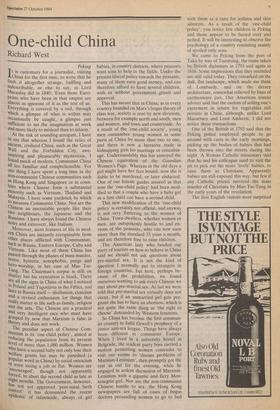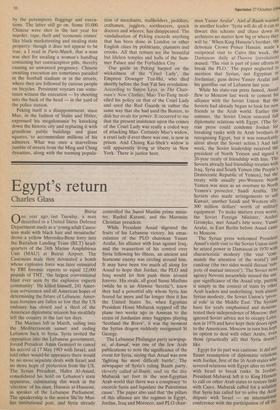One-child China
Richard West
It is customary for a journalist, visiting China for the first time, to write that he finds it altogether strange, baffling and indescribable, or else to say, as Lord Macaulay did in 1840: 'Even those Euro- Peans who have been in that empire are almost as ignorant of it as the rest of us. Everything is covered by a veil, through Which a glimpse of what is within may occasionally be caught, a glimpse just sufficient to set the imagination at work and more likely to mislead than to inform.' At the risk of sounding arrogant, I have to say that whereas I found the relics of ancient, civilised China, such as the Great Wall and the Forbidden City, awe- inspiring and pleasurably mysterious, I found much of modern, Communist China all too familiar and comclrehensible. For one thing I have spent a long time in the non-communist Chinese communities such as Hong Kong and Singapore or in coun- tries where Chinese form a substantial minority such as Vietnam, Thailand and Malaysia. I have some yardstick by which to measure Communist China. Nor are the Chinese an inscrutable people like their two neighbours, the Japanese and the Russians: I have always found the Chinese noisy and extrovert, like Italians. Moreover, most features of life in mod- ern China are instantly recognisable from other places afflicted with Communism, such as Russia, Eastern Europe, Cuba and Vietnam. Like most of them China has Passed through the phases of mass murder, terror, hysteria, xenophobia, purge and hero-worship, in her case of Mao Tse- Tung. The Chairman's corpse is still on display but his reputation is black. There are all the signs in China of what I noticed in Poland and Yugoslavia in the Fifties, and later in Russia itself — disillusion, cynicism and a revised enthusiasm for things that really matter in life such as family, religion and the arts. The Chinese are a practical and very ihtelligent race who must have grasped by now that Marxism is false in theory and does not work. The peculiar aspect of Chinese Com- munism is its 'one-child policy', aimed at reducing the population from its present level of more than 1,000 million. Women who have a second baby not only lose their welfare grants but may be punished (a Popular word in China) by social ostracism or even losing a job or flat. Women are _encouraged', though not apparently for to abort the second child as late as Fight months. The Government, however, has not yet approved 'post-natal birth control': it has denounced the recent epidemic of infanticide, always of girl
babies, in country districts, where peasants want sons to help in the fields. Under the present liberal policy towards the peasants, many of them earn good money, and can therefore afford to have several children, with or without government grants and approval.
This has meant that in China, as in every country founded on Marx's bogus theory of class war, society is rent by new divisions, between for example north and south, men and women, and town and countryside. As a result of the 'one-child society', young men outnumber young women in some parts of China by more than two to one, and there is now a lucrative trade in kidnapping girls for marriage or concubin- age. Understandably this has annoyed the Chinese equivalent of the Guardian Women's Page. Whereas in the old days a girl might have her feet bound, now she is liable to be murdered, or later abducted. One of our female guides assured us that now the 'one-child policy' had been mod- ified so that a couple who have a baby girl as a first child can have a second child.
This new modification of the 'one-child policy' is certainly not official, and anyway is not very flattering to the women of China. Town-dwellers, whether women or men, are outspokenly hostile to .and en- vious of the peasants, who can now earn more than the standard 35 yuan a month, and are therefore free to raise children.
The American lady who briefed our party of tourists on how to behave in China said we should not ask questions about pre-marital sex. It is not the kind of question I normally put to strangers in foreign countries, but here, perhaps be- cause of the prohibition, we found ourselves wanting to ask every Chinese we met about pre-marital sex. At last we were told that pre-marital sex virtually does not occur, but if an unmarried girl gets pre- gnant she has to have an abortion: which is not quite the same thing as 'the right to choose' demanded by Western feminists.
So China has become the first commun- ist country to fulfil Orwell's prophecy of a junior anti-sex league. Things have always been different in communist Europe. When I lived in a university hostel in Belgrade, the student party boss carried a motion permitting women comrades to visit our rooms to 'discuss problems of Marxism-Leninism', then promptly got the rest us out for the evening, while he engaged in ardent discussion of Marxism- Leninism with a gigantic and fiery Mon- tenegrin girl. Nor are the non-communist Chinese hostile to sex: the Hong Kong newspapers are full of cases of bogus doctors persuading women to go to bed with them as a cure for asthma and skin ailments. As a result of the 'one-child policy', you notice few children in Peking and those appear to be fussed over and petted. It will be interesting to observe the psychology of a country consisting mainly of spoiled only sons.
We came to Peking from the port of Taku by way of Tsientsing, the route taken by British diplomats in 1793 and again in 1816. Some impressions that they recorded are still valid today. They remarked on the dull, flat landscape, which made me think of Lombardy, and on the dreary architecture, somewhat relieved by lines of earthenware jars. Our American tourist adviser said that the custom of selling one's excrement in return for vegetables still persists in China, although, unlike Lord Macartney and Lord Amherst, I did not notice these transactions.
One of the British in 1793 said that the Peking police employed people to go around with carts in the early mornings, picking up the bodies of babies that had been thrown into the streets during the night. A Roman Catholic missionary said that he and his colleague used to visit the pit to pick out the more 'lively' babies, to raise them as Christians. Apparently babies are still exposed this way, but few if any Catholic priests survived the mass murder of Christians by Mao Tse-Tung in the early years of the revolution.
The first English visitors were surprised by the peremptory floggings and execu- tions. The latter still go on. Some 10,000 Chinese were shot in the last year for murder, rape, theft and 'economic crimes' like black marketeering and stealing state property: though it does not appear to be true, a I read in Paris-Match, that a man was shot for stealing a woman's handbag containing her contraceptive pills, thereby causing an unwanted pregnancy. Chinese awaiting execution are sometimes paraded in the football stadium or in the streets, where they are followed by curious people on bicycles. Persistent voyeurs can some- times witness the execution — by shooting into the back of the head — in the yard of the police station.
Peking itself is a disappointment, since Mao, in the fashion of Stalin and Hitler, expressed his megalomania by knocking down the historic city and replacing it with grandiose public buildings and giant squares, to accommodate millions of his admirers. What was once a marvellous jumble of streets from the Ming and Ching dynasties, along with the teeming popula- tion of merchants, stallholders,, peddlers, craftsmen, jugglers, soothsayers, quack doctors and whores, has disappeared. The vandalisation of Peking exceeds anything that has been done in London or other English cities by politicians, planners and crooks. All that remain are the beautiful but lifeless temples and halls of the Sum- mer Palace and the Forbidden City.
Our guide in Peking harped on the wickedness of the 'Cruel Lady', the Empress Dowager Tzu-Hsi, who died shortly before the Sun Yat Sen revolution. According to Simon Leys, in The Chair- man's New Clothes, Mao Tse-Tung mod- elled his policy on that of the Cruel Lady and used the Red Guards in rather the same way that she had used the Boxers, to dish her rivals for power. It occurred to me that the present insistence upon the crimes of the Cruel Lady was really a coded way of attacking Mao. Certainly Mao's widow, a cruel lady if ever there was one, is now in prison. And Chiang Kai-Shek's widow is still apparently living at liberty in New York. There is justice here.



















































 Previous page
Previous page